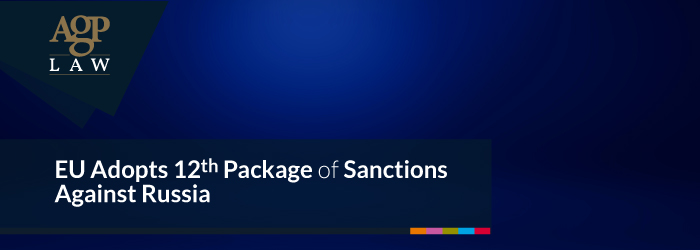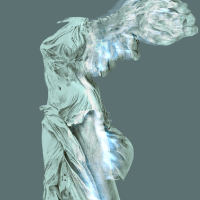
On December 18, 2023, the European Commission issued the 12th package of sanctions imposed by the European Union against Russia, Regulation (EU) 2023/2878 of the Council of December 18, 2023, amending Regulation (EU) No. 833/2014 concerning restrictive measures due to actions by Russia destabilizing the situation in Ukraine.
For the relevant publication in the Official Journal of the European Union, please click here.
As far as legal services are concerned, an additional provision is introduced within the regulatory framework of the European Union’s Restrictive Measures, which is the introduction of Article 5(i) within the provisions of Regulation (EU) No. 833/2014, which provides the following:
Article 5r
- Legal persons, entities and bodies established in the Union whose proprietary rights are directly or indirectly owned for more than 40 % by: a) a legal person, entity or body established in Russia; b) a Russian national; or c) a natural person residing in Russia, shall, as of 1 May 2024, report to the competent authority of the Member State where they are established, within two weeks of the end of each quarter, any transfer of funds exceeding 100 000 EUR out of the Union that they made during that quarter, directly or indirectly, in one or several operations.
- Notwithstanding the applicable rules concerning reporting, confidentiality and professional secrecy, credit and financial institutions shall, as of 1 July 2024, report to the competent authority of the Member State where they are located, within two weeks of the end of each semester, information on all transfers of funds out of the Union of a cumulative amount, over that semester, exceeding 100 000 EUR that they initiated, directly or indirectly, for the legal persons, entities and bodies referred to in paragraph 1.
- Member States shall assess the information received in accordance with paragraphs 1 and 2 to identify transactions, entities and business sectors that indicate a serious risk of breaches or circumvention of, or use of funds for purposes incompatible with, this Regulation or Council Regulations (EU) No 269/2014, (EU) No 692/2014 (*) or (EU) 2022/263 (**), or Council Decisions 2014/145/CFSP (***), 2014/386/CFSP (****), 2014/512/CFSP or (CFSP) 2022/266 (*****), and shall regularly inform each other and the Commission of their findings.
- Based on the information received from the Member States under paragraph 3, the Commission shall review the functioning of the measures provided for in this Article no later than 20 December 2024.
(*) Council Regulation (EU) No 692/2014 of 23 June 2014 concerning restrictive measures in response to the illegal annexation of Crimea and Sevastopol (OJ L 183, 24.6.2014, p. 9).
(**) Council Regulation (EU) 2022/263 of 23 February 2022 concerning restrictive measures in response to the illegal recognition, occupation or annexation by the Russian Federation of certain non-government-controlled areas of Ukraine (OJ L 42 I, 23.2.2022, p. 77).
(***) Council Decision 2014/145/CFSP of 17 March 2014 concerning restrictive measures in respect of actions undermining or threatening the territorial integrity, sovereignty and independence of Ukraine (OJ L 78, 17.3.2014, p. 16).
(****) Council Decision 2014/386/CFSP of 23 June 2014 concerning restrictive measures in response to the illegal annexation of Crimea and Sevastopol (OJ L 183, 24.6.2014, p. 70).
(*****) Council Decision (CFSP) 2022/266 of 23 February 2022 concerning restrictive measures in response to the illegal recognition, occupation or annexation by the Russian Federation of certain non-government-controlled areas of Ukraine (OJ L 42 I, 23.2.2022, p. 109).’;
In addition:
- Ban on Russian nationals to own, control or hold posts in the governing bodies of entities providing crypto-asset wallet, account or custody services – In order to limit the circumvention of the prohibition on the provision of crypto-asset wallet, account or custody services to Russian persons and residents, the 12th EU Russia Sanctions Package includes a ban on Russian nationals or natural persons residing in Russia from owning or controlling, or holding any posts on the governing bodies of, the legal persons, entities or bodies providing such services.
- Expansion of controlled business services covered under Article 5n -The existing prohibition on the provision of certain services to the Government of Russia or Russian entities (e.g., accounting, auditing, bookkeeping or tax consulting services, business and management consulting or public relations services, advertising services, architectural and engineering services, legal advisory services, IT consultancy, market research and public opinion poll services and technical testing and analysis services) was expanded to prohibit the sale, supply, transfer, export, or provision of software for the management of enterprises and software for industrial design and manufacture used in the areas of architecture, engineering, construction, manufacturing, media, education and entertainment.
- This new prohibition could have a material impact on the operation of Russian subsidiaries of Western companies’ dependent on ERP and other types of business software. The software items covered by this prohibition are listed in new Annex XXXIX to Regulation (EU) 833/204 as follows: a) enterprise resource planning (ERP), customer relationship management (CRM), business intelligence (BI), supply chain management (SCM), enterprise data warehouse (EDW), computerized maintenance management system (CMMS), project management software, product lifecycle management (PLM), and typical components of the above-mentioned suites, including software for accounting, fleet management, logistics and human resource; and b) building information modelling (BIM), computer aided design (CAD), computer-aided manufacturing (CAM), engineer to order (ETO), and typical components of above-mentioned suites.
- Wind down of the “partner country” exemption for controlled business services under Article 5n7 – The EU will eliminate, following a six-month wind-down period expiring on 20 June 2024, the exemption for the provision of controlled business services to Russian subsidiaries of companies headquartered in the EU or other partner countries. This means that an authorization from the competent authority will be required to continue to provide controlled business services to Russian subsidiaries of companies headquartered in the EU or other partner countries. The list of partner countries for these purposes currently includes US, Japan, UK, South Korea, Australia, Canada, New Zealand, Norway and Switzerland.
- Extension of Article 12b divestment licensing grounds – The deadlines for the licensing grounds for the sale, supply, licensing, import or transfer of controlled items and the provision of controlled business services where necessary for the purposes of divestment from Russia have been extended to 30 June 2024, 31 July 2024, or 30 September 2024, depending on the relevant sanction.
- Ban on Russian diamonds – Inclusion of a new Article 3p to ban the purchase, import, or transfer of diamonds and products, like jewelery and watches, incorporating diamonds originating in or exported from Russia or diamonds of any origin transiting Russia. This is in addition to a ban on imports of Russian diamonds when they are processed (cut and polished) in third countries (such as India) that will be phased in. Measures include a phased import ban (i) on diamonds and jewellery made from Russian diamonds as from 1 January 2024, (ii) on Russian diamonds of certain higher weight processed in third countries as from 1 March 2024 (based on a G7-coordinated traceability mechanism) and (iii) on smaller Russian stones processed in third countries as from 1 September 2024. To implement these measures, new traceability-based evidence will be required from importers.
- Additional import bans – Import bans on items which generate significant revenues for Russia (listed in a re-issued Annex XXI to Regulation (EU) 833/2014), such as pig iron and spiegeleisen, copper wires, aluminum wires, foil, tubes and pipes. In addition, a new import ban on liquefied propane (LPG) was introduced with a 12-month transitional period.
- Additional export bans – Banning the sale, supply, transfer and export of additional items which contribute to Russia’s military and technological enhancement (listed in a re-issued Annex VII to Regulation (EU) 833/2014), such as chemicals, lithium batteries, thermostats, as well as motors and servomotors for drones that Russia uses for military production; and certain industrial items (listed in a re-issued Annex XXIII to Regulation (EU) 833/2014), for instance machinery and parts.
In addition, the EU added 29 entities to the list of those directly supporting Russia’s military and industrial complex in its war of aggression against Ukraine (listed in a re-issued Annex IV to Regulation (EU) 833/2014). These entities will be subject to tighter export restrictions concerning dual use items, as well as items which might contribute to the technological enhancement of Russia’s defence and security sector.
- Expansion of the transit ban – The transit ban that currently applies to dual use items exported from the EU to third countries via the territory of Russia was extended to certain industrial items listed in new Annex XXXVII to Regulation (EU) 833/2014.
- Additional measures to enforce the oil price cap – In order to further support the implementation of, and compliance with, the price cap mechanism, the EU introduced a strengthened information sharing mechanism requiring businesses to share price information for ancillary costs, such as insurance and freight, upon request throughout the supply chain of Russian oil trade. The EU has also introduced notification rules for the sale of tankers to any third country in order to make more transparent their sale and export, in particular in the case of second-hand carriers that could be used to evade the import ban on Russian crude or petroleum products and the G7 Price Cap.
- “No Russia” clause – The EU has imposed a requirement on EU exporters to insert contractual clauses prohibiting re-exports to Russia and re-exports for use in Russia of particularly sensitive items, when selling, supplying, transferring or exporting to any third country, with the exception of partner countries in Annex VIII to Regulation (EU) 833/2014. The scope of this clause is currently limited to items used in Russian military systems or critical to the development, production or use of those Russian military systems, as well as aviation items and weapons. The requirement to introduce the “No Russia” export clause also applies retrospectively to all agreements concluded before 19 December 2023, subject to a transition period (i.e., the earlier of 20 December 2024 or their expiry date).
- Iron and steel – The EU included a new Annex XXXVI to Regulation (EU) 833/2014 to list partner countries which apply a set of restrictive measures on imports of iron and steel from Russia, and a set of import control measures that are substantially equivalent to those of the EU (for now, just limited to Switzerland and Norway). This means that importers are not required to provide evidence of the country of origin of the iron and steel inputs for the processing of products when such products originate in these countries. In addition, the EU has also extended the wind-down periods for the import of specific steel products.
- Personal use exemption for sanctioned products – The EU introduced exemptions to import restrictions concerning personal use items, such as personal hygiene items, or clothing worn by travelers or contained in their luggage, and for cars that have a diplomatic vehicle registration plate to enter the EU. Additionally, to facilitate the entry into the EU of EU citizens living in Russia, Member States can authorize the entry of their cars provided that they are not for sale and are driven strictly for personal use.
The information provided by AGP Law | A.G. Paphitis & Co. LLC is for general informational purposes only and should not be construed as professional or formal legal advice. You should not act or refrain from acting based on any information provided above without obtaining legal or other professional advice.













